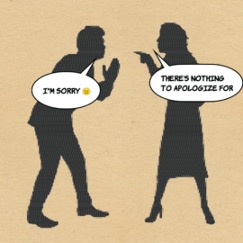It’s easy to spot someone who apologizes too much. They’re the ones who say I’m sorry for everything, even things that aren’t their fault. They might even apologize for apologizing.
If you’re friends with someone who always apologizes too much, you might have noticed that it can be frustrating. You might feel like they’re always apologizing for things that they don’t need to apologize for.
There are a few things you can say to someone who always apologizes too much. First, you can try to get them to see that they don’t need to apologize for everything.
You can also tell them that their apologies are appreciated, but that they don’t always need to say I’m sorry.
In this article, we’ll be looking at the most suitable responses to someone who constantly apologizes.
20 Things to Say to Someone Who Constantly Apologizes
Here, we’ll be looking at some of the most suitable responses to someone who constantly apologizes.
There are 2 ways to reply to someone who constantly apologizes. You might decide to reply to them sternly if the constant apology is getting frustrating and the apology is not usually sincere.
If the constant apology is a result of naivety and timidity, then a more accommodating reply would be suitable to help this person know that they don’t have to be timid when relating which could help them relatively stop that bad habit.
We’ll be touching on both types of replies in this list to cater to both scenarios.
Here are 20 things you can say to someone who’s always apologizing:
1. There’s nothing to apologize for

Some people apologize for everything, even when they haven’t done anything wrong. If you’re constantly apologizing, it can make you seem like you’re not confident or secure in yourself. And it can make the other person feel like they have to walk on eggshells around you.
There’s nothing to apologize for is a great response to someone who is constantly apologizing. This person is likely apologizing for things that they don’t need to be apologizing for, and by saying this, you’re letting them know that.
It’s a way of saying that you don’t think they need to keep apologizing and that you don’t think whatever they’re apologizing for is a big deal.
This can be a relief to someone who feels like they’re always apologizing and can’t help it. It can also be empowering, letting them know that they don’t need to keep apologizing and that they can control when and why they apologize.
2. I appreciate your apology, but it’s not necessary
If someone constantly apologizes, they might feel like they are never doing enough or they are always messing up.
Telling them that their apology is appreciated, but not necessary can help take the pressure off. It can also show that you understand they are sorry and that you forgive them.
This response can help foster a healthy relationship where both parties feel comfortable communicating and apologizing when needed.
3. Please don’t apologize. It makes me feel uncomfortable
When someone is constantly apologizing, it can make the person on the receiving end feel uncomfortable.
In these cases, it is appropriate to say Please don’t apologize. It makes me feel uncomfortable. This sends a clear message that the apology is not needed and that the individual would prefer it if the other person stopped apologizing.
It also shows that the individual is not interested in continuing the conversation if the other person continues to apologize.
This response is direct and to the point, and it will hopefully get the message across to the other person that their apology is unwanted and unnecessary.
4. Sorry, but I don’t accept your apology

Saying Sorry, but I don’t accept your apology. is a suitable response to someone who constantly apologizes. This person is likely apologizing for something they did wrong, but they keep doing it.
They may be sorry, but they haven’t changed their behavior. As a result, their apologies are not genuine and are not effective.
By saying Sorry, but I don’t accept your apology, you are sending a message that this person needs to change their behavior before their apology will be accepted.
This response is assertive and sets a boundary. It is also likely to be effective in getting this person to change their behavior.
5. I don’t think an apology is warranted in this situation
Saying I don’t think an apology is warranted in this situation is a perfectly reasonable response to someone who is constantly apologizing.
After all, if someone is constantly apologizing, it stands to reason that they may not actually be sorry for their actions. In fact, they may be using their apologies as a way to deflect responsibility or avoid taking accountability for their actions.
It can be frustrating to constantly be on the receiving end of someone’s apologies, especially if you don’t feel like they’re actually sincere.
But by responding with I don’t think an apology is warranted in this situation, you’re essentially setting a boundary and letting the other person know that their apologies are not welcome or needed.
This can be an effective way to get the message across that their apologies are not appreciated, and that they need to take responsibility for their actions without constantly trying to deflect blame.
6. What you did doesn’t warrant an apology
When someone is constantly apologizing, it can be frustrating. You might feel like they are never taking responsibility for their actions and are always trying to make excuses.
Saying what you did doesn’t warrant an apology is a way of telling them that their apology is not necessary and that they should take responsibility for their own actions.
This can be a difficult conversation to have, but it is important to be honest with someone who is constantly apologizing.
It will help them to see that their actions have consequences and that they need to take responsibility for their own choices.
7. I don’t think you’re sorry, and even if you are, I won’t forgive you
If someone constantly apologizes but never seems to actually be sorry, or even if they are sorry but you don’t feel like forgiving them, then saying I don’t think you’re sorry, and even if you are, I won’t forgive you is a perfectly valid response.
This lets them know that you don’t believe their apologies are sincere and that even if they are, you don’t feel like forgiving them. If they continue to try and apologize or convince you to forgive them, you can simply repeat this response.
8. Your apology is insufficient
When someone constantly apologizes, it can become tiresome and feel insincere. In response, saying Your apology is insufficient is a way of calling out the insincerity and letting the person know that their apology is not being accepted.
This response can be effective in stopping the apologizing behavior as well as sending a message that the apology is not good enough.
It can also be a way to hold them accountable for their actions and encourage them to be more thoughtful in the future.
9. This isn’t the first time you’ve done this/said this/acted this way, and I’m getting really tired of it

Saying this isn’t the first time you’ve done this/said this/acted this way, and I’m getting really tired of it is a suitable response to someone who constantly apologizes for their actions.
This person is clearly not taking responsibility for their actions and is instead choosing to blame others for their own mistakes. This is an unhealthy pattern of behavior that needs to be addressed.
By calling out this behavior, you are helping to hold this person accountable and hopefully helping them to see the error of their ways.
10. I don’t care if you’re sorry or not. Just don’t do it again
If someone is constantly apologizing to you, it can be frustrating. You might feel like they don’t care about your feelings or they don’t understand what they did wrong. In these cases, it can be helpful to say I don’t care if you’re sorry or not. Just don’t do it again.
This way, you’re expressing that you don’t want to hear their apologies anymore and that you just want them to change their behavior.
This can be a tough message to deliver, but it can be effective in getting the other person to stop apologizing all the time.
11. I noticed you apologized three times in the span of five minutes. I’m not sure what you’re apologizing for
If someone is constantly apologizing, it can be difficult to know how to respond. In some cases, it may be appropriate to simply say I noticed you apologized three times in the span of five minutes. I’m not sure what you’re apologizing for.
This can be a way of indicating that you are not sure what the person is apologizing for and that you are not necessarily expecting or needing an apology.
In other cases, it may be more appropriate to ask the person directly why they are apologizing or what they are apologizing for. This can help to clarify the situation and may help the person to stop apologizing excessively.
12. I know you’re sorry, but you don’t need to apologize all the time. It’s okay
If someone is constantly apologizing, it might be because they feel like they’re always doing something wrong or they’re not good enough. Telling them I know you’re sorry, but you don’t need to apologize all the time.
It’s okay is a way of saying that you understand how they feel, but that they don’t need to keep apologizing because they’re not always doing something wrong.
This can help the person feel more confident and less like they’re always walking on eggshells.
13. It’s not a big deal
It’s not a big deal. is a suitable response to someone who constantly apologizes. This person is probably apologizing for everything, even things that are out of their control or that they didn’t do wrong.
By constantly apologizing, they are devaluing their own actions and words. It’s not a big deal is a way of saying that you don’t need to apologize and that what you did or said is not a big deal.
This statement can help the other person to feel more confident and to stop apologizing for everything.
14. It’s okay to make mistakes
Saying It’s okay to make mistakes. is a suitable response to someone who constantly apologizes because it helps the person to understand that it is okay to make mistakes and that they should not feel bad about it.
This response also shows that the person who is saying it is understanding and supportive.
15. Everyone makes mistakes
Saying Everyone makes mistakes. is a suitable response to someone who constantly apologizes because it is true. Everyone makes mistakes, and there is no shame in admitting that.
Apologizing constantly can be a sign of low self-esteem, and it is important to remind the person that they are not their mistakes. Everyone is capable of making mistakes, but that does not make them bad people.
It is important to be accepting of mistakes and learn from them, rather than dwelling on them.
16. I’m not mad at you
The phrase I’m not mad at you. is a suitable response to someone who constantly apologizes because it communicates that the speaker is not angry with the person they are speaking to.
This can be an effective way to diffuse a tense or awkward situation and to let the other person know that there is no ill will between the two of them.
It can also be a way to show forgiveness and understanding, which can be valuable in maintaining a positive relationship.
17. Your apologies are getting old
When someone is constantly apologizing, it can become tiresome and bothersome. In response to this, you might say Your apologies are getting old, to let the person know that their apologies are no longer needed or appreciated.
This phrase is a way of telling the person to stop apologizing, as it is becoming repetitive and unnecessary.
18. I’m not falling for your apologies anymore
Saying I’m not falling for your apologies anymore is a way of setting a boundary with the other person. It’s a way of saying that you’re not going to tolerate their bad behavior any longer.
And it’s a way of saying that you’re not going to be taken for granted. The next time the other person apologizes, you can simply say, I’m not falling for your apologies anymore.
This will send a clear message that you’re no longer going to tolerate their behavior. And it may be the wake-up call they need to finally change their ways.
19. Just stop
Saying just stop in response to someone who constantly apologizes may seem like a harsh response, but it can be a suitable one.
If someone is constantly apologizing for their actions, it can be frustrating and overwhelming. It can also be a way for them to avoid taking responsibility for their actions.
Saying just stop can be a way of telling them that their apologies are not needed or wanted. It can also be a way of telling them to take responsibility for their actions and to stop apologizing for something that they have done.
20. I might just puke if you apologize one more time.
If someone is constantly apologizing, it can be frustrating. In some cases, it might be a genuine apology for something that the person feels bad about.
However, in other cases, it might be a way for the person to avoid taking responsibility or manipulating the situation. In either case, saying I might just puke if you apologize one more time is a suitable response.
It conveys that the person apologizing is getting on your nerves and that you are not going to tolerate it anymore.
Conclusion
If you find someone constantly apologizing to you, it might be time to take a step back and reassess the situation. There are a few things you can say to help them see that their apologizing is excessive and that it might be time to start changing their behavior.
First, try to point out specific instances where they apologize excessively. This can help them see that they might not even realize they’re doing it.
For example, you could say, I noticed you apologized three times in the span of five minutes. I’m not sure what you’re apologizing for.
If they’re still not getting the message, you can try being more direct. Say something like, I know you’re sorry, but you don’t need to apologize all the time. It’s okay.
If they continue to apologize excessively, it might be helpful to have a conversation about why they feel the need to do so. There could be an underlying issue that’s causing them to apologize constantly.
For example, they might feel like they’re not good enough or they might be afraid of conflict. By talking about it, you can help them understand why they apologize so much and work on finding a solution.
